 Petzlover
Petzlover Perro de Presa Mallorquin is originated from Spain but Nenets Herding Laika is originated from Russia. Both Perro de Presa Mallorquin and Nenets Herding Laika are of same height. Perro de Presa Mallorquin may weigh 10 kg / 23 pounds more than Nenets Herding Laika. Both Perro de Presa Mallorquin and Nenets Herding Laika has almost same life span. Both Perro de Presa Mallorquin and Nenets Herding Laika has almost same litter size. Perro de Presa Mallorquin requires Low Maintenance. But Nenets Herding Laika requires High Maintenance
Perro de Presa Mallorquin is originated from Spain but Nenets Herding Laika is originated from Russia. Both Perro de Presa Mallorquin and Nenets Herding Laika are of same height. Perro de Presa Mallorquin may weigh 10 kg / 23 pounds more than Nenets Herding Laika. Both Perro de Presa Mallorquin and Nenets Herding Laika has almost same life span. Both Perro de Presa Mallorquin and Nenets Herding Laika has almost same litter size. Perro de Presa Mallorquin requires Low Maintenance. But Nenets Herding Laika requires High Maintenance
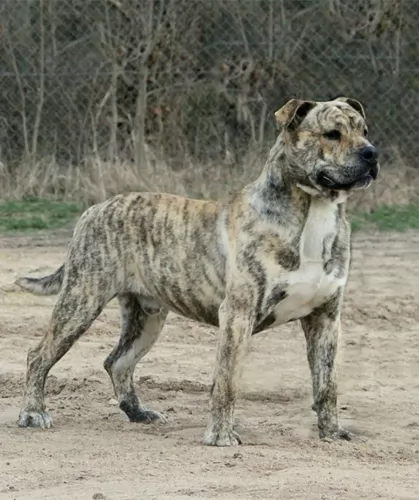 Known by several other names such as Majorca Mastiff, Perro Dogo, Ca de Bou and Mallorquin Bulldog among others, the Perro de Presa Mallorquin was almost extinct after World War II.
Known by several other names such as Majorca Mastiff, Perro Dogo, Ca de Bou and Mallorquin Bulldog among others, the Perro de Presa Mallorquin was almost extinct after World War II.
The British brought their own dogs with them into the Balearics, crossing them with native mastiffs. They were used for fighting, explaining why this dog also got the name Ca de Bou as it means Bull Dog.
It is believed that the dogs were crossed with the Perro de Pastor Mallorquin, Alano Espanol and the Bulldog.
 There is a large variety of Laika dogs as the word is almost a generic term for a type of Russian hunting dog. They are found in Northern Russia and Siberia and there are several recognized by the Federation Cynologique International including the East Siberian Laika, the Russian European Laika, and the West Siberian Laika. These Siberia Laika are crosses between the aboriginal dogs of Siberia and northern Russia. The word Laika means a barking dog and comes from the word meaning to bark. These laikas are working dogs, hunting pointers that were bred specifically for their barks.
There is a large variety of Laika dogs as the word is almost a generic term for a type of Russian hunting dog. They are found in Northern Russia and Siberia and there are several recognized by the Federation Cynologique International including the East Siberian Laika, the Russian European Laika, and the West Siberian Laika. These Siberia Laika are crosses between the aboriginal dogs of Siberia and northern Russia. The word Laika means a barking dog and comes from the word meaning to bark. These laikas are working dogs, hunting pointers that were bred specifically for their barks.
All the dogs in this category are loyal and affectionate. They are hard workers and hunters/herders and sled dogs. Of the official Laika groups including the Nenets Herding Laika, there is the Karelo-Finnish Laika, the Northeasterly Siberian Laika, the West Siberian Laika, The Russian European Laika, Eastern Siberian Laika. The Laika are wary of strangers, noisy and rowdy.
The Laika breed known as the Nenets Herding Laika is also called the Reindeer Herding Laika. The breed is pretty ancient, developed by the Nentry tribe at about the same time that the nomads were developing the Samoyed. Like the Samoyed breed, the Nenets Herding Laika herded Reindeer. The artic breed originates from Russia and can be used for transportation and hauling as well.
While their temperament and history are very much the same as the Samoyed, they are recognized as separate breeds. However there are many aficionados of both breeds believe that the Samoyed and the Nenets Herding Laika are the same breed. For many the Samoyed are simply a white version of the Nenets Herding Laika.
The Nenets Herding Laika is also know as the Samoyed Laika, so you can see how close if not the same, these two breeds are. The Nenets Herding Laika was bred by the Nenet peoples. The Samoyed is all white while the Nenets is any variation of black, gray, piebald, red, white, sable and brown.
The dogs herd and guard reindeer, keeping the herd together and moving them from one pasture to another. They will also stay with a stray reindeer until they are found. They will do this whether they have food or water. They will bark to try to bring the people’s attention to the lost reindeer. They are also an excellent hunting and retrieving, swimming dog.
The Nenets are also known as Yurak Samoyeds and they are the largest group of Samoyedic peoples today. They live on both sides of Russian Ural Mountains in northern Russia and the Yamal Peninsula. They move large herds of reindeer to the winter lands south of the Artic Circle from the north – about 600-900 miles. It is believed that the Herding Laika originated with this group of people but spread beyond them. They were shipped to far northeast Siberia to be bred and shared with reindeer herding tribes there.
There is a longhaired or rough coated variety and a shorthaired variety. The Nenets consider the work routine of both varieties the same, but they believed that the shorthaired version was a more ancient than the longhaired version.
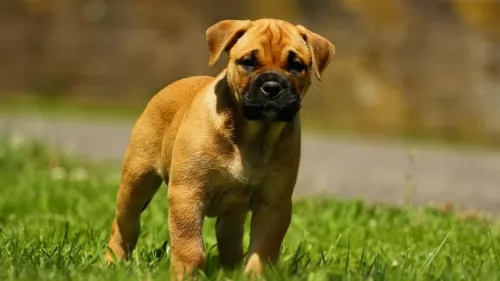 The Perro de Presa Mallorquin is a strong medium-to-large sized deep chested dog standing at between 52 and 58cm in height and weighing between 30 and 39kg, both male and female.
The Perro de Presa Mallorquin is a strong medium-to-large sized deep chested dog standing at between 52 and 58cm in height and weighing between 30 and 39kg, both male and female.
This is a molosser-type dog with a strong, powerful build and large head. The skin around the face is thick and loose. The coat of the dog is short and rough and the color is fawn to light brown and reddish tan shade He can also be brindle too or black with tan markings.
The jaw is strong, the ears short and floppy though they have always been traditionally cropped. When left they can be folded backward. The tail is long, set low and reaches to the hock.
This is an intelligent dog who is going to require training and socialization if you want to manage it properly. Training and socializing a dog can be very helpful and help a dog like this to be more obedient and well behaved.
As a puppy growing up with kids who have been taught to treat animals kindly and with respect, the Perro de Presa Mallorquin can get on well with children. However, if you’re bringing an older dog into your home, the very nature of the dog may mean it not getting on with children.
This dog is quiet by nature and will be loving and loyal towards his owner, being protective towards him. He is strong-willed and will do best with a strong, firm, kind, patient dog owner who is consistent.
He is active and will fit into life in the suburbs or the countryside as opposed to life on a tiny property in the city.
 This is a medium sized dog , muscular and strong. Slightly smaller than the Samoyed, the Nenets Laika weighs about 40-55 pounds and is 18 inches tall. The ears are typical Spitz ears and the tail is carried up over the back. The Nenets Herding Laika can have gray, piebald, black or tan coats and some can be solid white and look just like a Samoyed. The coat is a thick, double coat with the undercoat very wooly.
This is a medium sized dog , muscular and strong. Slightly smaller than the Samoyed, the Nenets Laika weighs about 40-55 pounds and is 18 inches tall. The ears are typical Spitz ears and the tail is carried up over the back. The Nenets Herding Laika can have gray, piebald, black or tan coats and some can be solid white and look just like a Samoyed. The coat is a thick, double coat with the undercoat very wooly.
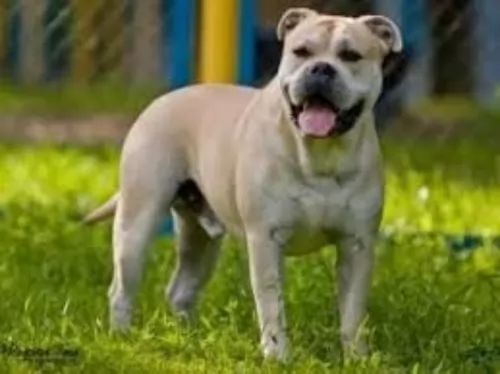 Your Perro de Presa Mallorquin is a loving dog, albeit it a bit stubborn. The key to having a dog with a sound temperament is to have him trained and socialized as this will do him the world of good and make him obedient and more balanced.
Your Perro de Presa Mallorquin is a loving dog, albeit it a bit stubborn. The key to having a dog with a sound temperament is to have him trained and socialized as this will do him the world of good and make him obedient and more balanced.
Irresponsible dog owners like to tie dogs like this up and leave them in the yard day after day to guard the home. They’re to blame when the dog becomes bored, frustrated and destructive.
Brought up correctly and given the right amount of love and care, the Perro de Presa Mallorquin is a brave, confident, quiet dog that can become a loyal and loving pet and companion.
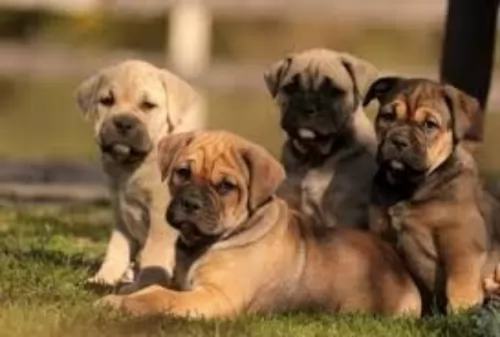 To avoid some of the common dog illnesses there are, you want to give your pet the best care possible. Of course there are always some dog illnesses that plague a dog and where he will require veterinary intervention. Hip dysplasia is one and larger dogs are more prone to getting this joint disease which can be very debilitating for your dog.
To avoid some of the common dog illnesses there are, you want to give your pet the best care possible. Of course there are always some dog illnesses that plague a dog and where he will require veterinary intervention. Hip dysplasia is one and larger dogs are more prone to getting this joint disease which can be very debilitating for your dog.
Other health issues can include osteosarcoma and lymphoma which are types of cancer Eye problems such as ectropion or entropion of the eyelids is where you'll find the eyelids turning either outwards or inwards. Also be aware of cataracts of the eyes as well as Cherry eye.
 For the most part the Nenets Herding Laika is a healthy breed and very hardy. They do however have some propensities for some illnesses and conditions.
For the most part the Nenets Herding Laika is a healthy breed and very hardy. They do however have some propensities for some illnesses and conditions.
Diabetes Mellitus – can be treated with medication and is usual seen in middle age -after 7 years of age.
PRA – Progressive Retinal Atrophy – Slow loss of vision and this is a genetic disease – leads to blindness.
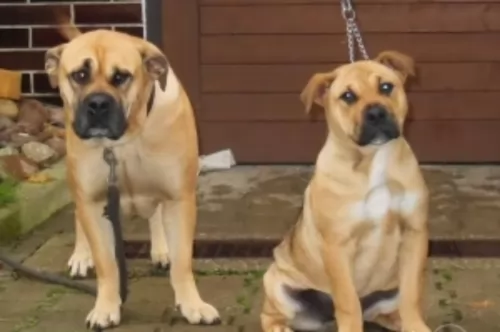 Your Perro de Presa Mallorquin is going to need a walk every day if you want him to be physically and mentally sound. He loves to sniff around and see the world beyond his garden.
Your Perro de Presa Mallorquin is going to need a walk every day if you want him to be physically and mentally sound. He loves to sniff around and see the world beyond his garden.
This is a low maintenance breed, requiring a brush twice a week just to maintain the coat in its heathy state and to remove loose hairs.
This purebred dog will need an adequate diet to keep him in tip top shape. He likes his food and because he is big and energetic, will require commercially manufactured dog food that is high in good quality protein. In fact always check the packaging that protein sources are among the top ingredients listed.
Growing puppies will require 4 helpings of food a day which can later become 2 meals a day.Try to include some home-made food for him. It doesn’t have to be complicated, in fact dogs want simplicity and consistency with their food so that they don’t get upset stomachs.
Boiled chicken, brown rice or pasta and cooked vegetables such as sweet potato, carrots and spinach chopped up and added into the kibble occasionally can be a wonderful tasty treat for your pet. It is also a good idea to try and give him some raw meat from time to time as well.
Avoid all spicy, unusual foods for your pet – he doesn’t want any surprises when it comes to his food. Ensure he always has a bowl of fresh, cool water available.
 Be careful that your pup doesn’t grow too fast. They are open to injuries if they grow too fast. Low calorie with protein and not a lot of fat. half a cup of high quality medium breed dog food 3X a day.
Be careful that your pup doesn’t grow too fast. They are open to injuries if they grow too fast. Low calorie with protein and not a lot of fat. half a cup of high quality medium breed dog food 3X a day.
1 1/2 cups high quality medium breed dog food.
athletic and agile
At leaset a walk or two every day. Don’t get overheated as they are used to cold weather. Would be good at agility and herding exercise.